Imagine a bustling hospital, with doctors and nurses darting from one patient to another, administrative staff managing appointments and records, and patients seeking care and comfort. In this complex ecosystem, efficiency is essential.
Yet, all too often, hospitals grapple with outdated systems. Piles of paperwork, and fragmented communication leads to delays, errors, and frustration for everyone involved. From missed appointments to misplaced files, the challenges of traditional hospital management can be overwhelming.
But it doesn’t have to be this way forever, especially now that we live and breathe technology. Hospital management software is a solution revolutionizing the way healthcare startups, health tech companies and organizations operate. With cutting-edge technology, these innovative platforms transform hospitals into efficient, patient-centered environments where every aspect of care is seamlessly integrated and effortlessly managed.
So, let’s explore hospital management software and what makes it an inseparable part of healthcare organizations followed by the steps of how to make hospital management software.
What is a Hospital Management Software?
Hospital management software (HMS) is the digital pillar of modern healthcare facilities. It serves as a comprehensive solution to streamline administrative, clinical, and financial processes.
At its core, HMS is robust software designed to centralize and automate a wide range of tasks, from patient registration and appointment scheduling to billing and inventory management. Healthcare management systems have rapidly grown, creating a separate progressive market.
Between 2024-2032, the size of the global hospital management software market is expected to grow at a CAGR of 9%.
– Expert Market Research
What are the Benefits of a Hospital Management System?
Wondering how beneficial for you to invest in Hospital management software (HMS)? Let’s check out some key benefits of implementing HMS in your organization:
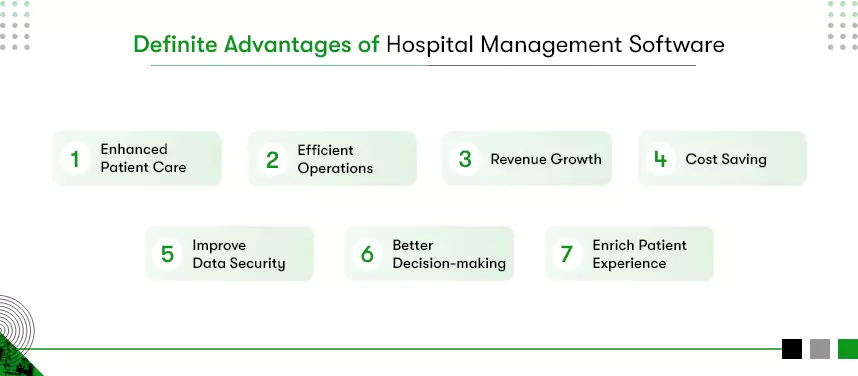
Enhanced patient care
By centralizing patient information, streamlining workflows, and improving communication among healthcare providers, HMS enhances the quality and continuity of patient care. With quick access to comprehensive electronic health records (EHR), you can make more informed decisions. It provides personalized treatment plans, and ensure better outcomes for patients.
Improved operational efficiency
HMS automates manual tasks, eliminates paper-based processes, and optimizes workflow management, leading to significant improvements in operational efficiency. From appointment scheduling and billing to inventory management and reporting, HMS streamlines administrative and clinical workflows. Consequently, your healthcare staff can focus more time and energy on patient care.
Increased revenue generation
The hospital management system enhances revenue cycle management by improving billing accuracy, accelerating claims processing, and reducing reimbursement delays. Automated billing and invoicing features help healthcare organizations maximize revenue, minimize revenue leakage, and improve cash flow, ultimately contributing to financial sustainability and growth.
Cost savings
By reducing administrative overhead, minimizing inefficiencies, and preventing revenue losses, HMS helps healthcare organizations in cost savings over time. From reduced paper and printing expenses to lower staffing requirements and improved resource utilization, the financial benefits of HMS extend beyond revenue generation to cost containment and optimization.
Enhanced data security and compliance
HMS ensures the security and integrity of patient data through robust data encryption, access controls, and audit trails. By maintaining compliance with healthcare regulations such as HIPAA (Health Insurance Portability and Accountability Act) and GDPR (General Data Protection Regulation), HMS protects sensitive patient information from unauthorized access, breaches, and data loss, safeguarding patient privacy and maintaining trust.
Better decision-making
With advanced reporting and analytics capabilities, HMS provides healthcare organizations with actionable insights into key performance metrics, trends, and patterns. By analyzing data trends and identifying areas for improvement, healthcare leaders can make data-driven decisions to optimize resource allocation, improve clinical outcomes, and drive organizational growth and innovation.
Enhanced patient experience
By streamlining administrative processes, reducing wait times, and improving communication, HMS enhances the overall patient experience. Patients benefit from smoother appointment scheduling, faster registration, and more personalized care, leading to increased satisfaction, loyalty, and positive word-of-mouth referrals.

Key Features of Hospital Management Software
Hospital management software (HMS) is a multifaceted tool designed to streamline operations and enhance patient care. Here are some of the key features that make HMS an indispensable asset for your healthcare organizations:
Patient management
Hospital management software centralizes all patient information, including demographics, medical history, and contact details. This centralized database ensures easy access and retrieval of patient records, facilitating efficient patient registration, admission, and discharge processes.
Appointment scheduling
With appointment scheduling functionality, hospital management software automates the way appointments are managed. Healthcare staff can efficiently book, reschedule, and cancel appointments, reducing wait times, and no-shows, and minimizing scheduling conflicts.
Electronic Health Records (EHR)
Hospital management software digitizes and centralizes patient health records, transforming the way patient data is captured, stored, and shared. include comprehensive clinical information such as medical history, diagnoses, medications, allergies, lab results, and imaging reports. By integrating Electronic health records (EHR) into HMS, you can improve decision-making, care coordination, and continuity of care across healthcare settings.
Billing and invoicing
Integrated billing modules in healthcare management software automate billing tasks, generate accurate invoices, and submit insurance claims electronically. It reduces billing errors and accelerates reimbursement cycles.
Inventory management
Hospital management software includes inventory management features to track and manage medical supplies, equipment, and pharmaceuticals. With real-time visibility into inventory levels, healthcare facilities can optimize stock levels, reduce excess inventory, and prevent stockouts.
Laboratory management
Dedicated laboratory management modules in hospital management software streamline laboratory workflows and improve efficiency in diagnostic testing. From test ordering and specimen tracking to result reporting and interpretation, these modules automate and standardize laboratory processes.
Types of Hospital Management Software
Hospital management software (HMS) comes in various forms, each customized to meet the specific needs and preferences of different healthcare organizations. Here are some common types of hospital management software:
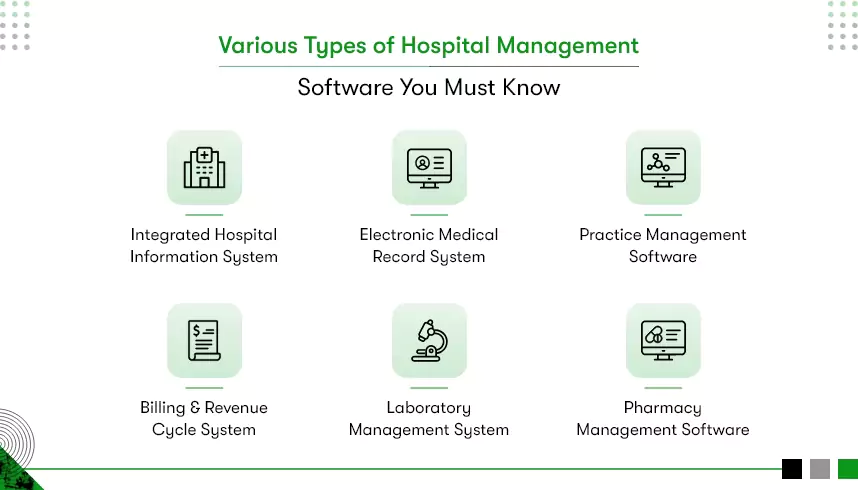
Integrated Hospital Information Systems (HIS)
Integrated HIS solutions offer diverse functionality to manage various aspects of hospital operations, including patient management, clinical workflows, administrative tasks, and financial processes. These all-in-one systems typically include modules for electronic health records (EHR), appointment scheduling, billing, inventory management, and reporting, providing a unified platform for managing all aspects of hospital operations.
According to Allied Market Research, from 2021 to 2030, with a CAGR of 11%, the Hospital Information Systems (HIS) Market is projected to reach $ 44,329.80 Million by 2030.
– Allied Market Research
Electronic Medical Record (EMR) Systems
EMR systems focus specifically on managing patient health records and clinical data within a healthcare facility. These systems digitize and centralize your organization’s patient information to facilitate efficient clinical documentation, decision-making, and care coordination. You may read more about developing latest EHR systems here.
Practice Management Software
Practice management software is designed for smaller healthcare practices, such as clinics, physician offices, and outpatient facilities. It is used mainly to streamline administrative tasks and improve operational efficiency. These systems typically include features for appointment scheduling, patient registration, billing, and reporting.
Billing and Revenue Cycle Management (RCM) Software
Billing and RCM software focuses specifically on optimizing revenue cycle management processes, such as claims processing, insurance billing, reimbursement tracking, and revenue analysis. These systems ensure the financial sustainability of healthcare organizations by maximizing revenue capture, minimizing billing errors, and accelerating reimbursement cycles.
Laboratory Information Management Systems (LIMS)
LIMS software is designed to streamline laboratory workflows and manage laboratory operations, including sample tracking, test ordering, result reporting, and quality control. These systems help laboratories improve efficiency, enhancing the quality and timeliness of diagnostic testing.
Pharmacy Management Software
Pharmacy management software is made to meet the unique needs of pharmacy operations. These systems help pharmacies improve medication safety, efficiency, and compliance with regulatory requirements, while also enhancing patient care and satisfaction.
Radiology Information Systems (RIS) and Picture Archiving and Communication Systems (PACS)
RIS and PACS software are specialized systems designed to manage radiology workflows and medical imaging data within healthcare facilities. RIS systems facilitate appointment scheduling, image tracking, and reporting for radiology departments, while PACS systems enable the storage, retrieval, and sharing of digital medical images, such as X-rays, CT scans, and MRIs, across healthcare settings.
10 Steps to Build Hospital Management Software
Developing hospital management software (HMS) requires attention to detail to ensure the successful delivery of a solution that meets the needs of your organization. If you are wondering how to create hospital management software, here are the essential steps to follow:
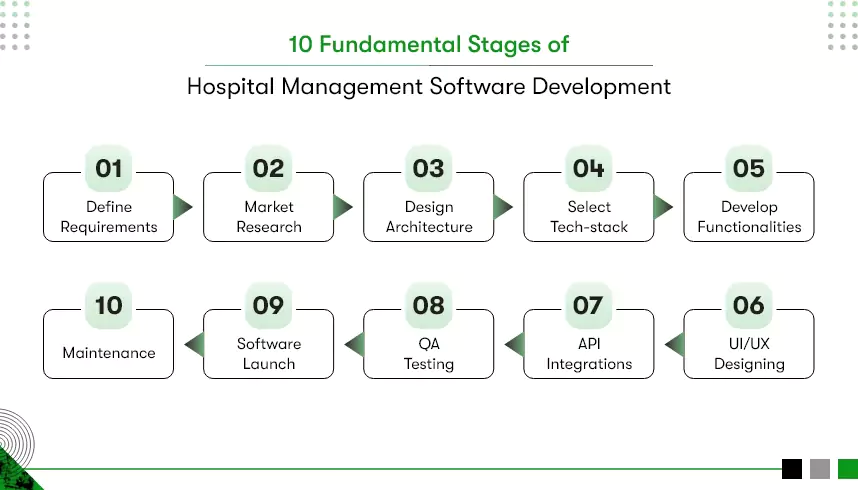
Step 1: Define requirements
The first step in building HMS is to clearly define the objectives of the software solution. This involves gathering input from key stakeholders, including healthcare providers, administrators, and IT professionals, to identify the specific features, functionalities, and workflows needed to support hospital operations effectively.
Step 2: Conduct market research
Conduct comprehensive market research to understand the current scenario of the hospital management system, including existing solutions, market trends, and competitor offerings. This research will help you with decision-making and ensure that the proposed HMS solution is competitive and aligned with industry standards.
Step 3: Design architecture
Develop a robust architectural design for the HMS solution, outlining the system’s structure. Consider factors such as scalability, security, interoperability, and usability when designing the architecture to ensure that the HMS solution can accommodate evolving healthcare needs.
Step 4: Select technology stack
Choose the appropriate technology stack for building the HMS solution based on the requirements and architecture design. This involves selecting programming languages, frameworks, databases, and development tools that align with your project’s objectives, budget, and timeline. Hiring flutter app developers to build hospital management software solutions has found to be effective and efficient when it comes to setting a budget and timeline.
Step 5: Develop core features
Begin development by focusing on building the core features and functionalities of the HMS solution. This includes modules for patient management, appointment scheduling, electronic health records (EHR), billing, inventory management, reporting, and analytics. Prioritize features based on their importance and impact on hospital operations.
Step 6: Implement UI and UX Design
Without an appealing interface, it is impossible to deliver a smooth user experience, right? So, design an intuitive and user-friendly interface for the HMS solution that enhances usability for your end users. Incorporate principles of user-centered design to create interfaces that are visually appealing, easy to navigate, and accessible across devices.
Step 7: Integrate third-party systems
Integrate the HMS solution with existing systems and third-party applications within the healthcare ecosystem, such as electronic medical record (EMR) systems, laboratory information management systems (LIMS), and billing software. Ensure seamless data exchange and interoperability to facilitate collaboration and information sharing among healthcare stakeholders.
Step 8: Test and quality assurance
Conduct rigorous testing and quality assurance (QA) activities to identify and address any issues or defects in the HMS solution. This includes functional testing, performance testing, security testing, and usability testing to ensure that the software meets the highest standards of quality.
Step 9: Deploy and implement
Deploy the hospital management system in a staged and controlled manner, starting with pilot testing in a small-scale environment before rolling it out to larger healthcare facilities. Provide training and support to your users to ensure a smooth transition to the new software solution.
Step 10: Monitor and maintain
Continuously monitor the performance and usage of the HMS solution post-deployment, collecting feedback from users and stakeholders to identify areas for improvement. Implement regular updates, patches, and enhancements to keep the HMS solution aligned with evolving healthcare needs and industry standards.

Conclusion
Hospital management software is the key to modernizing the way hospitals deliver care. By utilizing technology to streamline administrative processes, enhance clinical workflows, and improve communication among healthcare providers, HMS enables organizations to drive organizational success.
As the healthcare space continues to evolve, the importance of embracing innovative solutions like hospital management software cannot be overstated. Being a healthcare provider, you might not have a team to develop a hospital management system. In such cases, you should hire a hospital management software development company like Kody Technolabs. With the required expertise to navigate the complex terrain of healthcare software, our team can help you build robust healthcare management software.
Frequently Asked Questions (FAQs)
What kind of training and support are available for healthcare staff when implementing hospital management software?
Most hospital management software development companies offer comprehensive training and support services to assist healthcare staff in learning how to use the software effectively. This includes on-site training sessions, online tutorials, user manuals, and dedicated support channels to address any questions or issues that arise during implementation and beyond.
Is hospital management software suitable for all types of healthcare organizations, regardless of size or specialty?
Hospital management software solutions are scalable and adaptable to the needs of healthcare organizations of all sizes and specialties. From a small clinic to a specialized healthcare facility, HMS can be customized and configured to meet the unique requirements and workflows of different organizations.
Is the hospital management system customizable to fit the unique needs of different healthcare organizations?
Hospital management software solutions offer a high degree of customization to accommodate the diverse needs and workflows of various healthcare organizations. This customization involves creating specific modules, user interfaces and reports to align with the organization’s preferences. By providing flexibility and scalability, customizable HMS solutions enable healthcare organizations to adapt the software to their unique requirements, ultimately enhancing patient care.
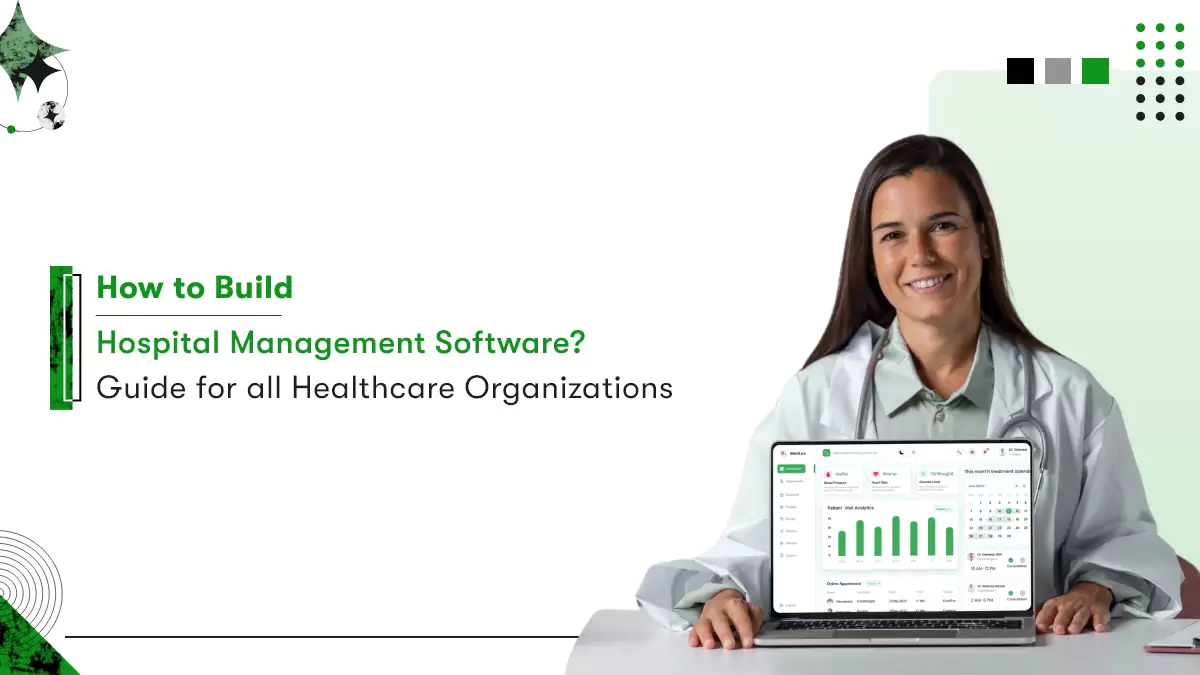

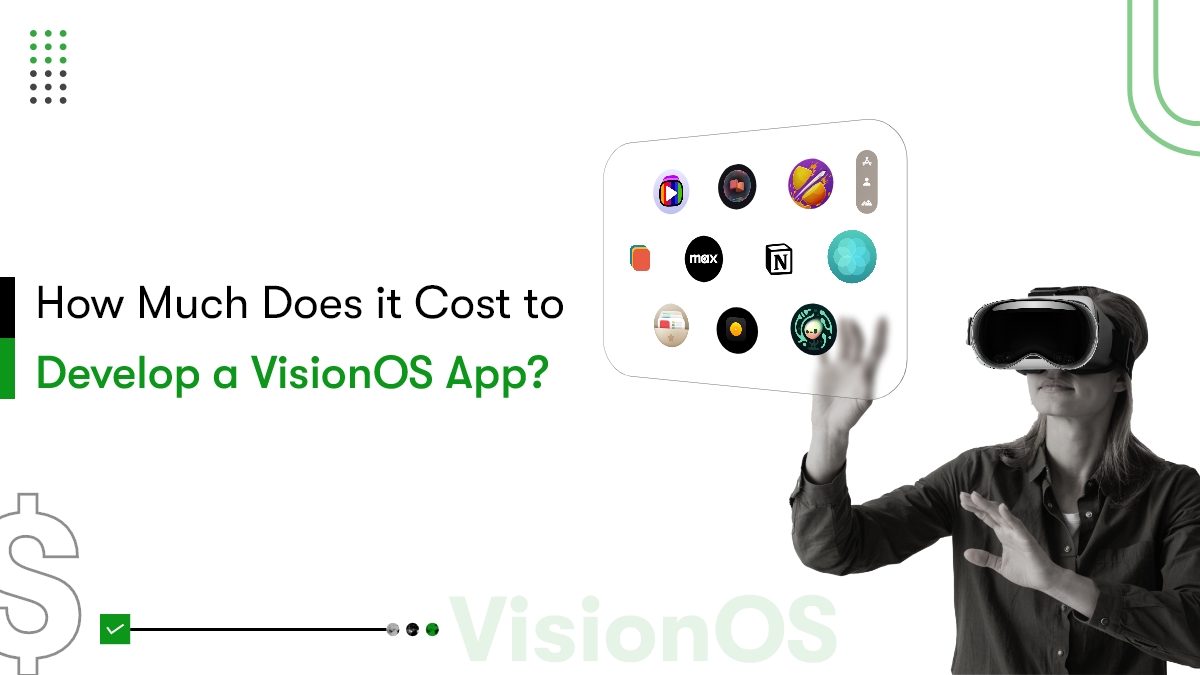
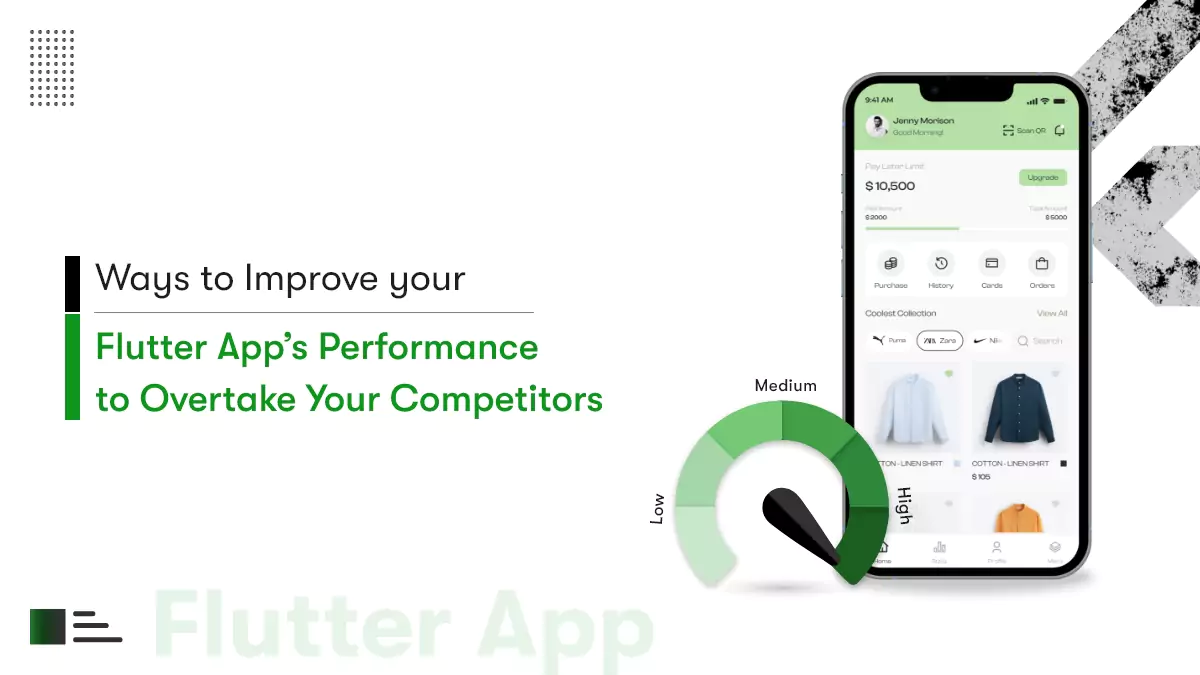
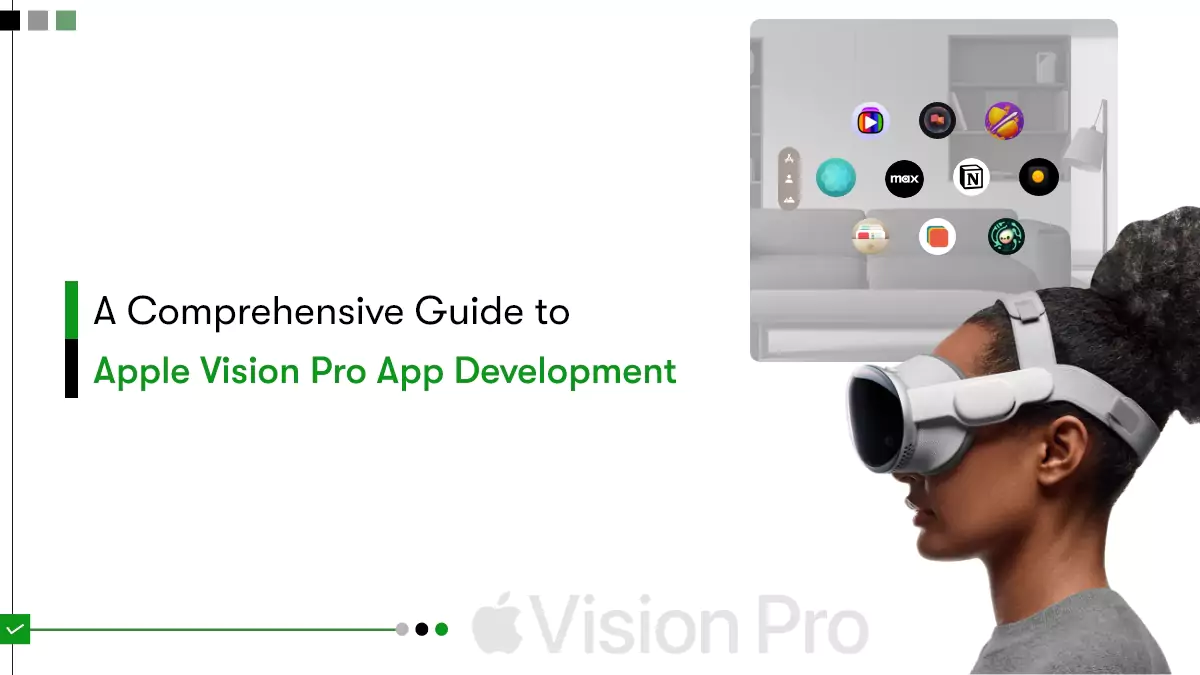






 Contact Information
Contact Information